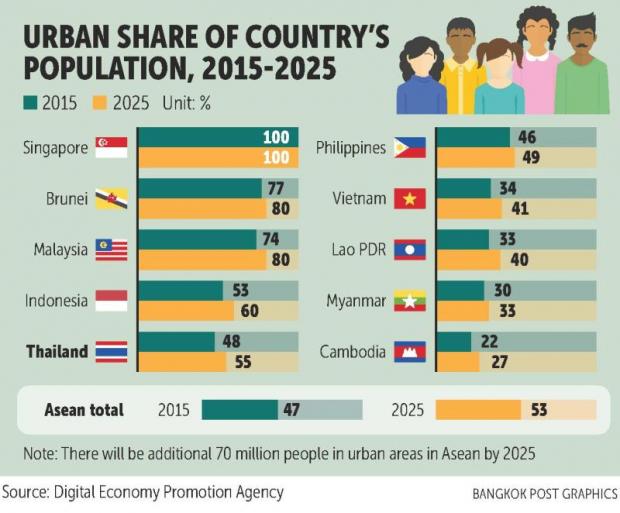
Access to capital is the most critical barrier for developing smart cities in Asean nations, including Thailand, as countries struggle to find alternative sources of investment for infrastructure projects with high upfront costs.
The government, through the Digital Economy Promotion Agency (Depa), is urging cities to collaborate with the private sector to form a city development company through a public-private partnership (PPP) to secure funding for development projects.
More importantly, the PPP model would enhance the use and management of assets in cities as well as embrace innovative businesses, accelerating the path to becoming a smart city or a city filled with sensors that collects data to optimise utilities like power grids and traffic lights.
The city development company model has already been established in Phuket, Chiang Mai and Khon Kaen.
Passakon Prathombutr, senior executive vice-president and chief technology officer of Depa, said partnerships with the private sector in any province is the key to success.
Local firms should collaborate on developing smart infrastructure by sharing data and brainstorming innovative ways to tackle cities' major challenges.
He said the city development company model is the best way to ensure effective operation and management of development projects.
The government is eager to see local businesses in other provinces consider forming city development companies as a way to enhance the use and management of assets, enabling the development of smart cities in line with the government's digital economy roadmap.
Mr Passakon said local firms have to know the strengths of their province and prioritise smart city agendas.
The government is gearing up for its target to promote smart city development in 24 provinces by next year.
Last year, 10 zones in seven provinces already began their smart city transformations.
The government plans to further develop 30 smart city zones in 24 provinces in 2019 and extend its target to 100 smart city zones in 76 provinces and Bangkok by 2022.
BARRIERS TO DEVELOPMENT
Mr Passakon said there are three critical barriers to developing smart cities in Asean countries: financial, implementation and decision-making.
Financial barriers are the most critical issue for Asean countries, followed by implementation of procedures, including regulatory structures that should ease smart city development.
For financial barriers, many smart city development procedures face challenges on promising return on investment and the fiscal capacity to launch infrastructure projects that require high upfront costs.
Smart city development projects need to find alternative capital sources to succeed.
Implementation barriers include lack of clear and robust long-term planning or adequate manpower, technical expertise or materials.
The implementation of smart city development needs efficient coordination and regulatory structures, he said.
Decision-making is also a major barrier to development, with limited information about the results and costs of taking certain actions, as well as about the technology to be used in the projects.
A SMARTER REVOLUTION
Smart city development by adopting digital technology is being widely implemented in the region as part of national agendas, Mr Passakon said.
The ICT Federation of Cambodia is constructing a smart town near Phnom Penh. The new town will make use of ICT in various aspects to boost performance and convenience, optimise resource consumption and actively connect with citizens.
Laos introduced a connected CCTV system and connected household electricity meter scheme in Vientiane.
For Vietnam, Da Nang aims to become smart city by 2025, working with IBM to develop smart city infrastructure to address water management, energy and disaster warnings.
In Myanmar, the government introduced the Yangon Payment System in 2017, which standardises payment methods on its public transport system.
The card system will help Yangon Region Transport Authority better ensure bus reliability to the public.
NEW PROPOSALS WELCOME
Mr Passakon said the government through the National Smart City Committee launched a first call event for smart city proposals last month, urging all existing and new cities to submit smart city proposals.
The proposals must meet the following criteria: 1) have clear geographical boundaries and goals for the smart city; 2) having an infrastructure investment and development plan; 3) having a design for an open and secure city data platform; 4) providing smart city solutions in any or all of the seven categories; and 5) having a sustainable management model.
The approved cities will be entitled to use the Smart City Thailand logo and can apply for investment privileges from the Board of Investment.
Smart city transformation involves any or all of the seven smart city categories: economy, mobility, energy, living, people, governance and environment.